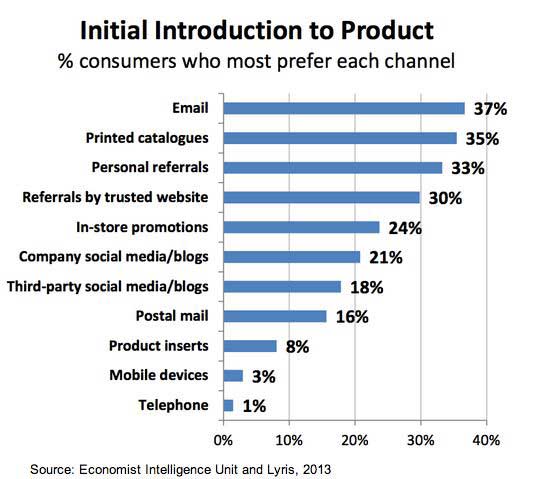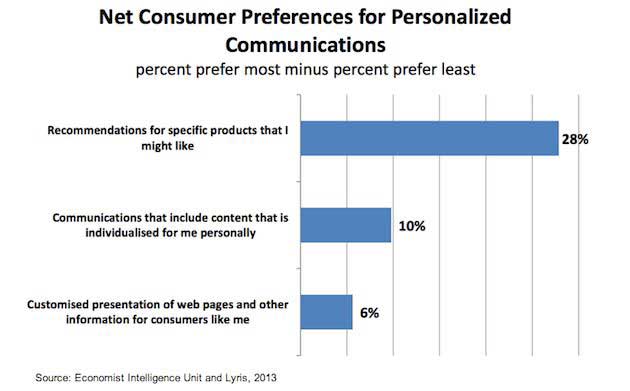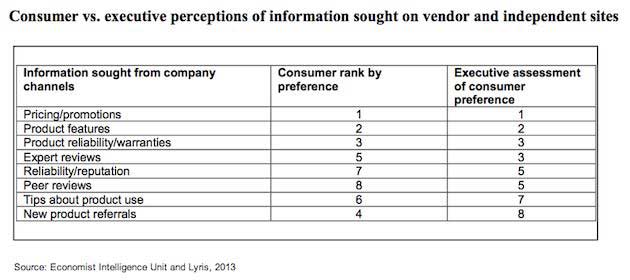Although marketers are eager to build up social media, blogs, and mobile outlets, email holds more sway in the purchasing process, according to a recent report by the Economist Intelligence Unit and Lyris.
The report, which was based on a pair of concurrent surveys of consumers and marketing executives in the US and UK, also found that gaps exist in marketers’ perceptions of how consumers want to engage with brands, what influences their purchase decisions, and how they view privacy.
Below, key findings.
Email Preferred Over Social, Blogs
- Consumers like social media for promotions (62%), but they predominantly prefer to learn about products via company websites (51%), email (19%), and independent websites (19%).
- Even for younger consumers surveyed, those age 20-30, email ranked second (19%) behind company websites (48%) as the preferred way to engage with a brand—far ahead of social media sites (5%) and blogs (2%).

Customization Over Personalization
- Consumers surveyed said the volume of personalized marketing messages they receive has increased over the past five years.
- The majority (63%) said personalization is now so common that they have grown numb to it, and 33% of consumers cited superficial personalization as one of their top annoyances.
- Only 14% of consumers said they are more likely to read personally addressed messages, yet personalization remains the second most popular marketing strategy of the executives surveyed.
- Though consumers are put off by superficial personalization, they do appreciate customized product recommendations.

'Big Data' Is a Struggle for Marketers
- Almost half of marketing executives surveyed (45%) indicated that they lack the capacity for analyzing "Big Data."
- 50% of marketing executives said they have inadequate budgets for digital marketing/database management.
- Only 24% of marketers always use data for actionable insight. This limited competency in data analysis is viewed by 45% of executives as a major obstacle to implementing more effective strategies.
- Only 27% of the marketing executives surveyed said they always integrate customer data from different sources into a centralized customer database.
What Consumers Look for on Websites
- When consumers research purchases online, 77% say they often spend their time comparing product prices and features. They prefer company channels over independent channels to do this research, by a wide margin.
- On the other hand, they rate independent channels as more important for subjective information, such as expert and peer reviews.
- Even though marketers surveyed were correct in assuming a high level of consumer interest in pricing/promotions, product features, and product reliability/warranties on websites, they attributed more importance than consumers to reliability/reputation, peer reviews, and expert opinion.

The Privacy Gap
- 21% of consumers said they are “very concerned" about the privacy of information contained in email communications with vendors, and 39% said they are concerned about information tracked by cookies when visiting company websites.
- Consumers are most concerned about data and preferences collected through "opt-in" processes, which they fear will be shared with third parties, regardless of company privacy policies. Some 33% of consumers say they are "very concerned" about the privacy of that type of information.
- In contrast, only 23% of marketing executives said their organization’s customers are very concerned about privacy of their information in the company’s marketing databases.
About the research: The Economist Intelligence Unit conducted two concurrent surveys, sponsored by Lyris, in March 2013. One asked 409 consumers and the other 257 executives about the effectiveness of different marketing channels. The respondents were balanced evenly between the US and the UK.




